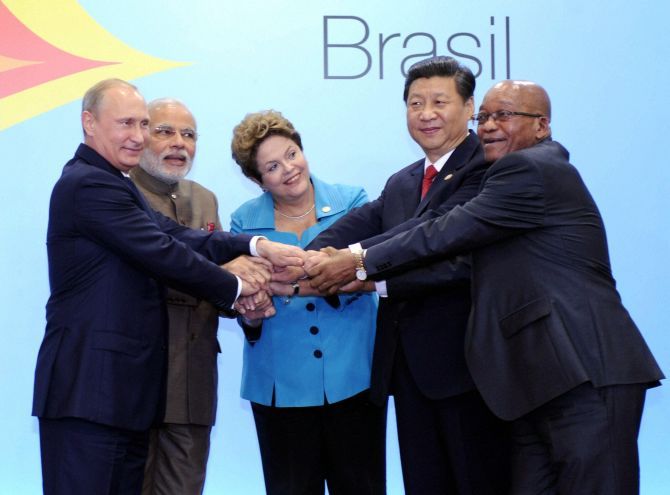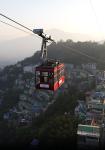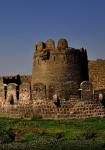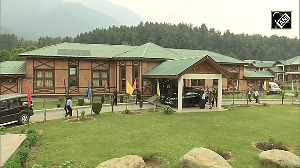'Happily,' says Ambassador B S Prakash, 'BRICS displayed new-found energy and built something real, a bank. Between needless nihilism and as yet unjustified euphoria, there are many stations for the BRICS train and we can watch its progress with renewed interest.'

So, Prime Minister Modi has returned from BRICS in Brazil, a really long trip, a day each way just for travel.
To use the football metaphor one last time -- all columnists, including me -- are guilty of having over used it this month, for anything connected with Brazil -- did he score any goals? Or again, to use another metaphor fast becoming a cliche, did BRICS build or cement anything?
First, a word about who usually asks this question. In the last few years, as the rate of economic growth in India, Brazil and South Africa dipped, there were expressions of scepticism, and arguments about the irrelevance of BRICS. These were mainly from the financial commentators or fund manager types in the pages of The Financial Times, The Wall Street Journal or the Economist.
Apart from pointing out the economic downturn, their view was also that BRICS lacked unity, cohesion and was unlikely to build anything. Many influential Indians read these papers and to some extent internalise such doubts. It was being pointed out that the acronym had outlived its utility: Newer cute names like MIST (Mexico, Indonesia, South Korea, Turkey) were knocking on the door of 'imagined communities'.
It is curious but true that the South-South cooperation -- the cooperation and coordination among developing countries -- is often mediated through the institutions that were originally set up by the developed world. Thus, the UNDP as the instrument for technical cooperation in the South, despite its high cost, Ernst and Young or KPMG to scrutinise or audit the work of NGOs in a poor country, IMF/World Bank experts to advise on reforming the economy etc. What had the South achieved?
Seen against this background, it is a relief that this time BRICS has decided to build something real and substantial. A new development bank, no less.
The contours of the bank and its capital have been covered in news reports, but some political points need to be noted. All the five BRICS countries will contribute equally and hence will have the same rights in the bank, a clear difference from the established institutions of Washington where members have unequal contributions and rights.
Countries have aspired for and secured different positions for themselves: For China, the venue; for India, the Presidency; for South Africa, a regional office etc. The lending will focus on infrastructure. An example that should illustrate the difference in lending policy is: Say a hydro-electric power project in India needs funding. The World Bank has reservations about dams, resultant displacements, environmental concerns etc in such projects. Not that these are illegitimate worries, but it reflects a certain perspective that may not be shared fully in developing countries like India, China, or Brazil.
Can the BRICS bank lend more easily to such a project? Possibly.
Similarly the agreement of a $100 billion fund as a Contingency Reserve Arrangement is something specific, concrete, and a facility that a country can 'lay its hands on'.
In this context, I find that two points made by Modi in his statements at BRICS are striking. He emphasised a. 'tangible outcomes' -- 'Let us make BRICS a platform of impact' and b. 'BRICS brings together members with future potential rather than existing prosperity or shared identities.'
It is a fair characterisation of the existing differences and limitations within BRICS, and a call for results rather than rhetoric. It should be satisfying for him that indeed there have been some outcomes.
What else apart from the Bank and the CRA? There are actually other actionable ideas that seem useful and are uniquely tailored for the BRICS stage of development. For example:
- Our countries need to look at the social parameters of development, and not economic parameters alone. Improvement in health and education are critical in all the five countries, but how to measure them? The statistical organisations in these countries can work together, exchange ideas and come up with metrics to measure and compare.
To my mind, this is a brilliant idea. We must recognise that in the developing world it is only the BRICS countries (and a few others) who have the academic and intellectual capacity to do work of this nature. The pooling of think-tank and academic resources is as interesting an idea as the pooling of capital under the CRA.
- All the five countries should worry about the massive surveillance undertaken by America's National Security Agency and disclosed by Edward Snowden. To be fair, it is not only Dilma of Brazil that is being listened to in her private conversations. It is Angela Merkel of Germany too! But the BRICS nations with their capabilities in ICT and their vulnerabilities with regard to cyber crime and cyber espionage could work together on data protection. It is a welcome sign that they intend to.
- Modi had interesting ideas at a sub-national level: For instance, a young scientists forum, a platform for online courses, BRICS language schools and some others. These are achievable goals and will make BRICS more visible.
Does the above positives convey a meeting of minds on all important issues? Certainly not. We should not delude ourselves that BRICS has unanimity of views on all key issues of the day. Again to illustrate:
- Will China and Russia, the two permanent members of the United Nations Security Council help India and Brazil to join them? No way. They only 'support the aspiration to play a greater role in the UN' according to the language of the final communique. What does it mean in real terms? Nothing.
- Do they all see Russia's actions in Ukraine the same way? They do not, but are sufficiently supportive of each other to paper over their differences.
A mix of some positive and negatives, then.
But, if you ask me, the reason why Prime Minisrer Modi may find his visit productive is on another front. It was the opportunity presented by BRICS so early in his innings to meet four important leaders in a neutral and relatively relaxed setting.
Much has already come out in the media about the long meeting with Chinese President Xi Jiping. It has turned out to be much more than a get to know each other occasion and has resulted in both leaders touching upon diverse issues: Boundary, peace and tranquilly on the border, trade deficit, role in other organisations like APEC and SCO, and bilateral visits.
With Russia's Putin our cooperation in defence, energy and nuclear fields came up. With Brazil and South Africa too, the prime minister got to meet his counterparts without having to wait for a bilateral context.
A multilateral occasion is a force multiplier for a busy leader. Modi has displayed his energetic side in Brazil. But happily, BRICS too displayed new-found energy and built something real, a bank. Between needless nihilism and as yet unjustified euphoria, there are many stations for the BRICS train and we can watch its progress with renewed interest.
B S Prakash is a former Ambassador to Brazil and a participant in previous BRICS summits.
Image: Prime Minister Narendra Modi with Brazil's President Dilma Rousseff, Russian President Vladimir Putin, Chinese President Xi Jinping and South African President Jacob Zuma at the 6th BRICS summit. Photograph: PTI









